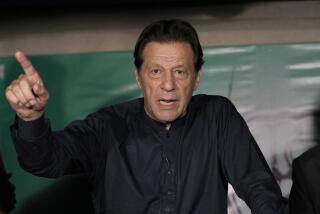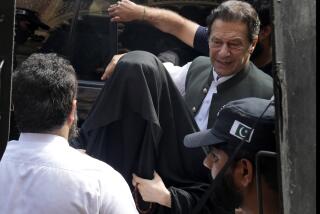Death Sentence for Boy, 14, Roils Pakistan : Asia: Youth was convicted of defiling a mosque with graffiti, though evidence was slight. Prime minister declines to intervene.
- Share via
ISLAMABAD, Pakistan — What is proper punishment for a 14-year-old boy convicted of defiling a mosque with sacrilegious graffiti?
Death by hanging, Pakistani law and a judge in the city of Lahore have decided.
The harsh penalty meted out this month to young Salamat Masih and another Christian, Rehmat Masih, 40, has beamed a glaring spotlight on Pakistan’s anti-blasphemy law, meant to punish insults against Islam and the Prophet Mohammed.
For some Pakistanis, the legislation and the mandatory death penalty that it carries cut to the quick of their country’s uneasy efforts to balance Islamic sanctity with a largely secular political and legal system. Pakistan’s small Christian community is particularly alarmed.
“Time has proven that this law has become a sword in the hands of religious fanatics who are out to eliminate religious minorities,” Roman Catholic Bishop John Joseph said.
Prime Minister Benazir Bhutto pronounced herself “surprised, shocked and saddened” by the Feb. 9 verdict. She said she is worried that the case will stir up controversy during her impending U.S. visit.
But badly stung last year by the ire of Islamic clerics who opposed her plan to amend the anti-blasphemy law, Bhutto said this time that she would not interfere in the legal process.
The trial of the Masihs was chilling, sometimes Kafkaesque. There was no physical evidence against the defendants, and the accounts of the three Muslims who brought the complaint conflicted on certain points.
During the trial before Judge Mujahid Hussain, the court was never explicitly told what allegedly had been chalked on the wall of the mosque in the Punjabi farming village of Ratta Dhotran on May 9, 1993.
The complainants said they erased the offensive remarks immediately. As for police, “the investigating officer admits that he did not read the words,” Mehbood Ahmed, a lawyer associated with the non-governmental Human Rights Commission of Pakistan, said.
Perhaps most bizarre and troubling is the defense lawyer’s contention that the younger Masih, who was 12 at the time of the alleged scribbling, is illiterate, and therefore couldn’t have written anything at all.
During the trial, one of the complainants, Muhammad Baksh Lambardar, had trouble reading a copy of the kalima tayyaba , the basic credo that most Muslims know by heart. So how could he have read graffiti to judge it blasphemous? some wondered.
*
Despite such holes in the case against the defendants, said by their lawyer to be unrelated, Hussain found them both guilty, sweeping aside their contention that Christian-Muslim tensions in the village had led some of their neighbors to bear false witness.
“No Muslim in my considered opinion would stoop so low as to prepare such indecent material containing derogatory remarks about the Holy Prophet, peace be upon him,” the judge said.
Attorneys for a militant Muslim group that had sought the guilty verdict were jubilant. “Every Muslim who believes and has faith should be happy about the decision,” lawyer Ismail Qureshi of the Anjuman Khatme Nabuwat organization said.
There had been a third defendant, Manzoor Masih, 40, charged in the same episode. But he was murdered outside the Lahore High Court last April by unidentified gunmen. Masih, meaning “messiah,” is a common family name among Pakistani Christians.
Asma Jahangir, chairwoman of the Human Rights Commission of Pakistan and the defendants’ attorney, appealed the verdict. The controversial case, she said, “concerns the very survival of non-Muslims in this country, if the final word is that a Muslim cannot make a false accusation in such a case.”
Jahangir had a personal encounter with the intense passions aroused by the case last Thursday, after she argued her appeal before the Lahore High Court.
As Jahangir walked to her car, she was threatened by about 200 bearded men wearing green turbans. They shouted threats at her, then grabbed and pummeled her driver. The windows of her car were smashed.
“If they beat my driver, damage my car, they can also kill me tomorrow,” Jahangir said.
Bhutto, who is due to visit the United States in April for talks with President Clinton, seemed especially concerned about the timing of the Lahore verdict. Her remarks, as reported by Pakistani journalists, indicated she feared the case could spoil her U.S. welcome and overshadow her attempts to focus world attention on alleged Indian human rights violations in the disputed Jammu and Kashmir state.
Last week, Bhutto said her government was holding consultations with religious parties to discuss making procedural changes in the blasphemy law. But it is uncertain what she can do.
Officials in Bhutto’s government suggested last year that the law be amended to prevent it from being falsely used to settle personal scores. But death threats were made against her law minister, and the uproar from traditionalist mullahs was so great that Bhutto was forced to backtrack.
Pakistani Christians, who estimate their flock at about 3 million of the country’s 125 million people, held a nationwide day of fasting to protest the death sentences and announced a special day of prayer this Wednesday.
“We want the man on the street to become aware that a small group is trying to create walls between the communities,” Bishop Samuel Azariah of the Protestant Church of Pakistan told the Friday Times, a Lahore weekly. “All citizens of this country should work together to crush this small but powerful group.”
The blasphemy law was introduced by the late military dictator Gen. Zia ul-Haq in 1986 as part of his campaign to make Pakistan an Islamic state. In 1991, the option of life imprisonment for convicted blasphemers lapsed, making the death sentence mandatory.
No one has ever been executed under the law, but according to press reports, at least six people accused of breaking it have been murdered by mobs. Within two weeks of the hit on Manzoor Masih, a Muslim cleric, Farooq Sajjad, was lynched by a crowd after rumors spread that he had burned pages from the Koran. He was believed to be the first Muslim murdered here for alleged blasphemy.
“This is the situation we have created by giving respectability to the hunt for blasphemous witches,” the Human Rights Commission of Pakistan commented. “Until now, those targeted were from the minority. But what happens now when the fire set off appears capable of consuming the ranks of the pious too?”
Salamat Masih and Rehmat Masih were imprisoned pending their appeal. They had left the court last April with their co-defendant when he was gunned down and were wounded by the gunfire.
“Even if they are finally acquitted, they will probably never be safe in their own country again,” Bishop Azariah said.
More to Read
Sign up for Essential California
The most important California stories and recommendations in your inbox every morning.
You may occasionally receive promotional content from the Los Angeles Times.












